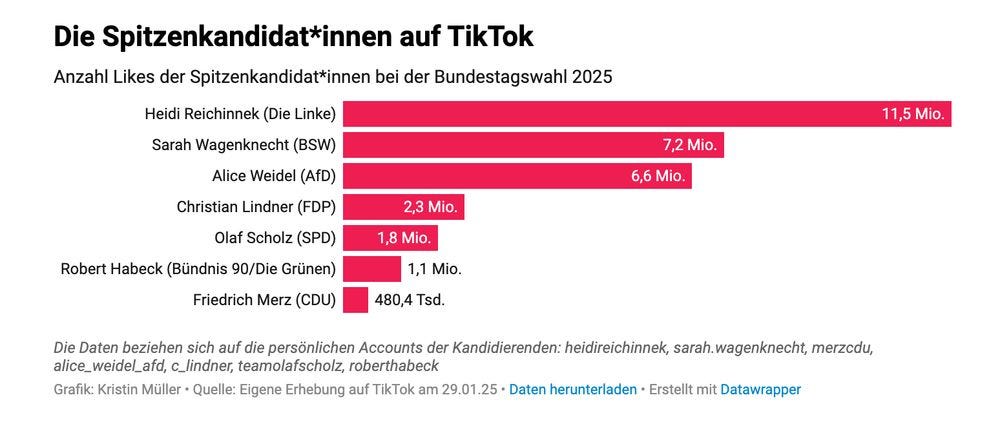Hello.
You are reading Understanding TikTok. My name is Marcus. It is 2025. I am on Bluesky now. The last months have been quite turbulent even by TikTok standards: grief (Sydney King), glitches (Rolling Stone) and gloom (a whole new era, Rolling Stone) as we start moving our feets in what may be TikTok’s last dance (The Cure) in the US (Verfassungsblog) before the new empire takes hold of all information spaces.
I have seen many people crying on the app that still is an essential transnational third space (default.blog) even when the vibes are off (Washington Post) and the golden age (Dazed) is over. It is still too early for a definite obituary (The Hollywood Reporter) as we will see more mayhem, more zigzagging, and more memes as we are living through a coup d'état, pretty wild (G. Willow Willson) a little perplexed (Justin Trudeau) observing mad king behaviour (Aaron Reichlin-Melnick).
🤡 From Hopecore to Hopelesscore
🦅 2025 German federal TikTok election
🛕 Academia: New TikTok papers
🪭 What else
🤡 From Hopecore to Hopelesscore
The time span between #136 and now coincidentally fits a memetic cycle that Adam Aleksic perfectly describes in his newsletter The Etymology Nerd: The meme genre (hopelesscore) — in which depressive language is presented motivationally to mock the earlier “hopecore” aesthetic — first started taking off on TikTok in November 2024.
Yet again memes as the lingua franca of the internet provide a sensitive seismograph for societal, political, mental shifts. Back in November 2024 German chancellor Olaf Scholz and his TikTok team for instance used a hopecore-video (2024-12-11) to communicate the end of his coalition (Spiegel). A somewhat dark, macabre Gen Z take anticipating hoplesscore as the remaing governing coalition is nowhere near a sufficient majority to win the early elections on February 23.
The memetic development from hope to hopeless and the following containment turning the trend into mere “‘content’ like any other online aesthetic, resigned to being farmed by TikTok spam accounts” (Aleksic) is a perfect metaphor for the current status quo of things. On to new meme cycles.
🦅 2025 German federal TikTok election
A federal election will be held in Germany on 23 February 2025 to elect the 630 members of the 21st Bundestag. Originally scheduled for 28 September 2025, the elections were brought forward due to the collapse of the governing coalition during the 2024 German government crisis.

All parties represented in the Bundestag rely on TikTok in this election cycle to reach 22.8 million TikTok users (population 84.5 million). While the last election in 2021 saw German political parties taking a more traditional sender-receiver approach, despite the far-right AfD, this time all parties take a more platform-literate approach, utilizing memes, trending sounds and outsourcing the distribution to authentic and inauthentic fan accounts.

I am currently collecting data for a report, but i will share some first observations in the coming weeks. In the meantime, here is something i wrote for the Mozilla Foundation in 2021: Broken Promises: TikTok and the German Election. And here is one on the last European elections 2024 for Friedrich Ebert Stiftung, german only sorry: Von Reichweite und Algorithmen: Analyse des Europawahlkampfs ausgewählter Parteien auf TikTok.
🎤 Quote
I think we’ll look back on these five years as an inflection point for social media, the era when the internet officially became real life
Rebecca Jennings
🛕 Academia: New TikTok papers
Fichman, P., & Akter, S. (2025). Political trolling on TikTok. Telematics and Informatics, 96, 102226.
Kalnes, Ø., & Bjørge, N. M. (2025). ‘So, we have occupied TikTok’: Ukrainian women in# ParticipativeWar. Media, War & Conflict, 17506352241307010.
Tanner, S., & Gillardin, F. (2025). Toxic Communication on TikTok: Sigma Masculinities and Gendered Disinformation. Social Media+ Society, 11(1), 20563051251313844.
Ibrahim, H., Jang, H. D., Aldahoul, N., Kaufman, A. R., Rahwan, T., & Zaki, Y. (2025). TikTok's recommendations skewed towards Republican content during the 2024 US presidential race. arXiv preprint arXiv:2501.17831.
Reinis, S., & Laughlin, C. (2025). “GOD IS MY SPONSORED AD!! MY ALGORITHM!”: The spiritual algorithmic imaginary and Christian TikTok. New Media & Society, 14614448251315128.
🪭 What else
TikTok's 'cute winter boots' trend explained (Usermag, 25 January 2025)
“TikTok refugees” drove a global Xiaohongshu boom (Rest of World, 24 January 2025) Here is an academic reading list
‘There Was Nothing Ever Unique About TikTok And I Can Prove It (Garbage Day, 20 January 2025)
Local news has invented another fake TikTok challenge (Usermag, 10 January 2025)
There is more to a political earthquake then TikTok in Romania (Eastblog, 19 December 2024
The year in brainrot (New Yorker, 16 December 2024) Is brainrot a myth (Dazed, 29 January 2025)
🎻 What i have been doing
Finally finished a version of a paper together with Tom Divon: Dancing in Uniform: The Role of Thirst Trap Propaganda in Military Image Wars on TikTok. I presented it at AoIR 2024 in Sheffield, Axel Bruns summed it up nicely here. Guest lectured on the same topic at University of Alberta, Media and Technology Studies. Thanks for having me Nicolette Little.
Joined Europe’s first Political Tech Summit to talk about Memes as Modern Soft-Propaganda-Tools and started a Systematic Literature Review on Memes of Misinformation.
Wrote a little essay on Postdigital Propaganda that got instantly desk rejected.
Taught two courses on TikTok for political communication at TH Köln – University of Applied Sciences, focusing on TikTok campaigns ahead of Germany’s Federal Election 2025. Will teach another course on political TikTok campaigns for a Master’s program in Political communication at Heinrich Heine University Düsseldorf in the coming semester.
Evaluated some journalistic TikTok formats, presented at Fraunhofer Gesellschaft, talked about Germany’s far-right on TikTok and joined a symposium on “Escalation”.
Thanks for reading. All typos are mine. Speak soon. Best, Marcus






